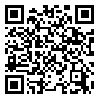Sun, Feb 1, 2026
[Archive]
Volume 35, Issue 1 (1-2021)
Med J Islam Repub Iran 2021 |
Back to browse issues page
Download citation:
BibTeX | RIS | EndNote | Medlars | ProCite | Reference Manager | RefWorks
Send citation to:



BibTeX | RIS | EndNote | Medlars | ProCite | Reference Manager | RefWorks
Send citation to:
Azami S, Hosseini S M, Alimohammadzadeh K, Jafari M, Bahadori M K. International Sanctions and the Procurement of Medical Equipment in Iran: A Qualitative Study. Med J Islam Repub Iran 2021; 35 (1) :1227-1236
URL: http://mjiri.iums.ac.ir/article-1-7839-en.html
URL: http://mjiri.iums.ac.ir/article-1-7839-en.html
Saeidreza Azami 

 , Seyed Mojtaba Hosseini
, Seyed Mojtaba Hosseini 

 , Khalil Alimohammadzadeh
, Khalil Alimohammadzadeh 

 , Mehrnoosh Jafari
, Mehrnoosh Jafari 

 , Mohammad Karim Bahadori
, Mohammad Karim Bahadori 




 , Seyed Mojtaba Hosseini
, Seyed Mojtaba Hosseini 

 , Khalil Alimohammadzadeh
, Khalil Alimohammadzadeh 

 , Mehrnoosh Jafari
, Mehrnoosh Jafari 

 , Mohammad Karim Bahadori
, Mohammad Karim Bahadori 


Department of Health Services Management, School of Management , North Tehran Branch, Islamic Azad University, Tehran, Iran , sm_hosseini@iau-tnb.ac.ir
Abstract: (2385 Views)
Background: Despite regulations to facilitate the purchase of medical equipment, the process is now faced with severe challenges due to the sanctions. This study focuses on the effects of the international sanctions on the process of procuring capital medical equipment in the Iranian health system.
Methods: A qualitative study using a content analysis approach was designed to investigate the effects of the international sanctions on capital medical equipment from January 2018 to June 2019. The data were gathered through 32 face-to-face, semi-structured interviews according to an interview guide. All the interviews were transcribed verbatim and analyzed accordingly. Thematic analysis with an inductive approach was employed for analyzing the data.
Results: After a comprehensive analysis of open codes, two themes and 9 sub-themes were formulated. Based on our findings, the challenges facing the Iranian health sector during international sanctions included: “procurement of capital medical equipment” (with 6 sub-themes: Capital medical equipment suppliers, Monetary and interbank transactions, Suppliers and importers of the capital medical equipment, The process of procurement of capital medical equipment, Healthcare providers and Service receivers) and “repairing and after-sales services of capital medical equipment,” (with 3 sub-themes: Software and spare parts dependent repair, Specialized human resources dependent repairing and after-sales services).
Conclusion: Even though the sanction has made Iranian scientists and technicians capable of re-engineering and producing some of the medical equipment and accessories, the study confirms the adverse effects of sanctions on the quality and quantity of medical equipment procurement, hence, delivering adequate and on-time medical services. In many cases, for money transfer issues, international companies were not sure they could have their money back if they sold the facilities to Iran. Fear of losing the US market was the other main consideration for the international companies.
Methods: A qualitative study using a content analysis approach was designed to investigate the effects of the international sanctions on capital medical equipment from January 2018 to June 2019. The data were gathered through 32 face-to-face, semi-structured interviews according to an interview guide. All the interviews were transcribed verbatim and analyzed accordingly. Thematic analysis with an inductive approach was employed for analyzing the data.
Results: After a comprehensive analysis of open codes, two themes and 9 sub-themes were formulated. Based on our findings, the challenges facing the Iranian health sector during international sanctions included: “procurement of capital medical equipment” (with 6 sub-themes: Capital medical equipment suppliers, Monetary and interbank transactions, Suppliers and importers of the capital medical equipment, The process of procurement of capital medical equipment, Healthcare providers and Service receivers) and “repairing and after-sales services of capital medical equipment,” (with 3 sub-themes: Software and spare parts dependent repair, Specialized human resources dependent repairing and after-sales services).
Conclusion: Even though the sanction has made Iranian scientists and technicians capable of re-engineering and producing some of the medical equipment and accessories, the study confirms the adverse effects of sanctions on the quality and quantity of medical equipment procurement, hence, delivering adequate and on-time medical services. In many cases, for money transfer issues, international companies were not sure they could have their money back if they sold the facilities to Iran. Fear of losing the US market was the other main consideration for the international companies.
Type of Study: Original Research |
Subject:
Health System
Send email to the article author
| Rights and permissions | |
 |
This work is licensed under a Creative Commons Attribution-NonCommercial 4.0 International License. |





